(完整word版)坎特伯雷故事集_中文版
- 格式:doc
- 大小:28.00 KB
- 文档页数:2
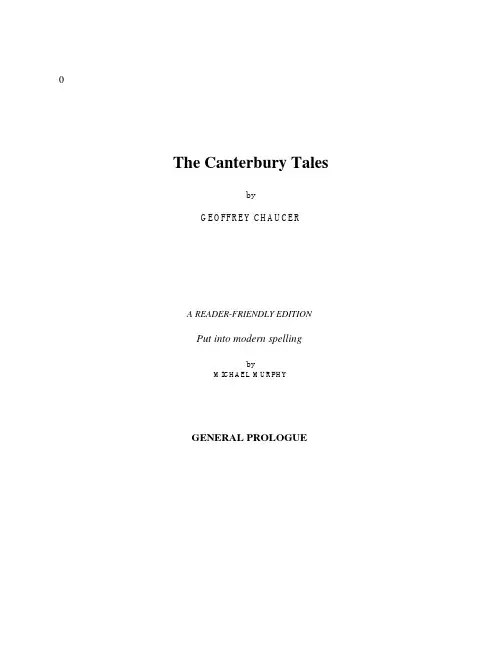
The Canterbury TalesbyGEOFFREY CHAUCERA READER-FRIENDLY EDITIONPut into modern spellingbyMICHAEL MURPHYGENERAL PROLOGUE11 When April with its sweet showers has pierced the drought of March to the root and bathed every rootlet inthe liquid by which the flower is engendered; when the west wind also, with its sweet breath, has brought forth young shoots in every grove and field; when the early sun of spring has run half his course in the sign of Aries, and when small birds make melody, birds that sleep all night with eyes open, (as Nature inspires them to) --THEN people have a strong desire to go on pilgrimages, and pilgrims long to go to foreign shores to distant shrinesknown in various countries. And especially they go from every county in England to seek out the shrine of the holy blessed martyr who has helped them when they were sick.2 4: "By virtue (strength) of which the flower is engendered."3 8: The early sun of Spring has moved part way through the sign of Aries (the Ram) in the Zodiac.4 13-14: "Pilgrims seek foreign shores (to go) to distant shrines known in different lands." Palmers : pilgrims,from the palm-leaves they got in Jerusalem.GENERAL PROLOGUEThe opening is a long, elaborate sentence about the effects of Spring on the vegetable and animal world, and on people. The style of the rest of the Prologue and Tales is much simpler than this opening. A close paraphrase of the opening sentence is offered at the bottom of this page.1W hen that April with his showers sooteits showers sweet The drought of March hath pierc •d to the root And bath •d every vein in such liquorrootlet / liquidOf which virtúe engendered is the flower;2 5When Zephyrus eke with his sweet • breath West Wind also Inspir •d hath in every holt and heath grove & fieldThe tender cropp •s, and the young • sun young shoots / Spring sunHath in the Ram his half • course y-run,3 in Aries / has runAnd small • fowl •s maken melodylittle birds 10That sleepen all the night with open eye Who sleep (So pricketh them Natúre in their courág es), spurs / spirits Then longen folk to go on pilgrimáges, people long And palmers for to seeken strang • strands pilgrims / shoresTo fern • hallows couth in sundry lands,4 distant shrines known15And specially from every shir •'s end county'sOf Eng •land to Canterbury they wend goThe holy blissful martyr for to seek,St. Thomas Becket That them hath holpen when that they were sick. Who has helped them2CANTERBURY TALES1 45-6: "He loved everything that pertained to knighthood: truth (to one's word), honor, magnanimityAt the Tabard Inn, just south of London, the poet-pilgrim falls in with a group of twenty nine other pilgrims who have met each other along the way.Befell that in that season on a day It happened20In Southwark at The Tabard as I lay inn name / lodged Ready to wenden on my pilgrimage to go To Canterbury with full devout couráge, spirit, heart At night was come into that hostelry inn Well nine and twenty in a company fully 29 25Of sundry folk by áventure y-fall by chance fallen ...In fellowship, and pilgrims were they all ...Into company That toward Canterbury woulden ride. wished toThe chambers and the stables weren wide were roomy And well we weren eas •d at the best. entertained 30And shortly, when the sunn • was to rest, sun had setSo had I spoken with them every one That I was of their fellowship anon, And mad • forward early for to rise agreementTo take our way there as I you devise. I shall tell you35 But natheless, while I have time and space, nevertheless Ere that I further in this tal • pace, Before I go Methinketh it accordant to reason It seems to me To tell you all the conditïon circumstances Of each of them so as it seem •d me, to me 40And which they weren, and of what degree And who / social rank And eke in what array that they were in; also / dress And at a knight then will I first begin.The Knight is the person of highest social standing on the pilgrimage though you would never know it from his modest manner or his clothes. He keeps his ferocity for crusaders' battlefields where he has distinguished himself over many years and over a wide geographical area. As the text says, he is not "gay", that is, he is not showily dressed, but is still wearing the military padded coat stained by the armor he has only recently taken off. A KNIGHT there was and that a worthy manThat from the tim • that he first began 45To riden out, he lov •d chivalry,Truth and honóur, freedom and courtesy.1CANTERBURY TALES3(freedom ), courtesy."1 52-3: He had often occupied the seat of honor at the table of the Teutonic Knights in Prussia, where badgesawarded to distinguished crusaders read "Honneur vainc tout: Honor conquers all." Though the campaigns listed below were real, and though it was perhaps just possible for one man to have been in them all, the list is probably idealized. The exact geographical locations are of little interest today. This portrait is generally thought to show a man of unsullied ideals; Jones (see Bibliography) insists that the knight was a mere mercenary.2 63: "In single combat (listes ) three times, and always (ay ) killed his opponent."3 64-67: The knight had fought for one Saracen or pagan leader against another, a common, if dubious,practice. And ever more ... may mean he always kept the highest reputation or that he always came away with a splendid reward or booty (prize)..Full worthy was he in his lord •'s war,lorde's = king's or God'sAnd thereto had he ridden--no man farre fartherAs well in Christendom as Heatheness heathendom50And ever honoured for his worthiness.His campaignsAt Alexandria he was when it was won. capturedFull often time he had the board begun tableAboven all • natïons in Prussia.1In Lithow had he reis •d and in Russia Lithuania / fought55No Christian man so oft of his degree. rankIn Gránad' at the siege eke had he be Granada / alsoOf Algesir and ridden in Belmarie. At Ley •s was he and at SatalieWhen they were won, and in the Great • Sea Mediterranean60At many a noble army had he be. At mortal battles had he been fifteenAnd foughten for our faith at Tramissene In list •s thric •, and ay slain his foe.2 combat 3 times & alwaysThis ilk • worthy knight had been also same65Sometim • with the lord of Palatie Against another heathen in Turkey,And ever more he had a sovereign prize,3alwaysHis modest demeanorAnd though that he was worthy he was wise, valiant / sensibleAnd of his port as meek as is a maid. deportment 70Ne never yet no villainy he saidrudenessCANTERBURY TALES4 1 70-71: Notice quadruple negative: "ne, never, no ... no" used for emphasis, perhaps deliberately excessiveemphasis. It is not bad grammar. The four negatives remain in Ellesmer's slightlly different version: "He never yet no villainy ne said ... unto no manner wight"2 74: "He (the Knight) was not fashionably dressed." horse was : most MSS read hors weere(n) = "horseswere." I have preferred the reading of MS Lansdowne.3 75-78: The poor state of the knight's clothes is generally interpreted to indicate his pious anxiety to fulfill areligious duty even before he has had a chance to change his clothes. Jones thinks it simply confirms that the knight was a mercenary who had pawned his armor. voyage : MSS have viage . Blessed viage was the term often used for the holy war of the crusades.479-80: A squire learned his future duties as a knight by attending on one. Bachelor is another word meaninga young man in training to be a knight.5 87: "And distinguished himself, considering the short time he had been at it."In all his life unto no manner wight.1 no kind of person He was a very perfect gentle knight. But for to tellen you of his array:His horse was good; but he was not gay.2 well dressed75Of fustian he wear •d a gipoun coarse cloth / tunic All besmotered with his habergeon, stained / mail For he was late y-come from his voyáge, just come / journeyAnd went • for to do his pilgrimáge.3The Knight's 20-year-old son is a striking contrast to his father. True, he has seen some military action, but it was to impress his lady not his Lord God. Unlike his parent, he is fashionably dressed.He is very much in love, he has cultivated all the social graces, and is also aware of his duty to serve as his father's squireWith him there was his son, a young • SQUIRE, 80A lover and a lusty bachelor 4With locks curled as they were laid in press.as if in curlers Of twenty years he was of age, I guess. Of his statúre he was of even length,moderate heightAnd wonderly deliver and of great strength, very athletic 85And he had been sometime in chivachy on campaign In Flanders, in Artois and Picardy,And borne him well as in so little space 5 conducted / timeIn hope to standen in his lady's grace. good gracesEmbroidered was he as it were a mead meadow90All full of fresh • flowers white and red.CANTERBURY TALES51 100: The table would be occupied at only one side, so when the Squire carved for his father, the Knight, hestood before him across the table.2 101: A servant of middle rank. This one looks after his master's forest land.3 104-114: Why a forester should be so heavily armed on a pilgrimage is not clear.Singing he was or fluting all the day. whistling? He was as fresh as is the month of May.Short was his gown with sleev •s long and wide.Well could he sit on horse and fair • ride.ride well95He could • song •s make and well endite, write words & music Joust and eke dance, and well portray and write.also / draw So hot he lov •d that by nightertale night(time) He slept no more than does a nightingale. Courteous he was, lowly and serviceable, 100 And carved before his father at the table.1Knight and Squire are accompanied by their Yeoman . He is noticeably over-armed for a pilgrimage, which indicates probably suspicion of the big city by a man more at home in the forest. A YEOMAN he had and servants no more 2 At that tim •, for him list • rid • so,it pleased him toAnd he was clad in coat and hood of green.A sheaf of peacock arrows bright and keen 105Under his belt he bore full thriftily.neatly Well could he dress his tackle yeomanly— care forHis arrows droop •d not with feathers low, And in his hand he bore a mighty bow.A not-head had he with a brown viságe. cropped head 110Of woodcraft could he well all the uságe. knew all the skills Upon his arm he bore a gay bracér elaborate armguardAnd by his side a sword and a bucklér shieldAnd on that other side a gay daggérfine, splendidHarnessed well and sharp as point of spear.3 Finely wrought 115A Christopher on his breast of silver sheen. St C. medal / brightA horn he bore, the baldrick was of green. cord A forester was he soothly as I guess.trulyThe Prioress is the head of a fashionable convent. She is a charming lady, none the less charming for her slight worldliness: she has a romantic name, Eglantine, wild rose; she has delicate tableCANTERBURY TALES6 1 120: The joke that presumably lurks in this line is not explained by the usual annotation that St. Eloy (orLoy or Eligius) was a patron saint of goldsmiths and of carters.2 123: Another joke presumably, but again not adequately explained.3 126: This is a snigger at the provincial quality of the lady's French, acquired in a London suburb, not inParis. Everything about the prioress is meant to suggest affected elegance of a kind not especially appropriate in a nun: her facial features, her manners, her jewelry, her French, her clothes, her name. Eglantine = "wild rose" or "sweet briar." Madame = "my lady."4 139-40: She took pains to imitate the manners of the (king's) court.manners and is exquisitely sensitive to animal rights; she speaks French -- after a fashion; she has a pretty face and knows it; her nun's habit is elegantly tailored, and she displays discreetly a little tasteful jewelry: a gold brooch on her rosary embossed with the nicely ambiguous Latin motto:Amor Vincit Omnia, Love conquers all.There was also a nun, a PRIORESS,head of a conventThat of her smiling was full simple and coy. modest120Her greatest oath was but by Saint Eloy,1 And she was clep •d Madame Eglantine. calledFull well she sang the servic • divine Entun •d in her nose full seem •ly.2And French she spoke full fair and fetisly nicely125After the school of Stratford at the Bow, For French of Paris was to her unknow.3 At meat • well y-taught was she withall: meals / indeedShe let no morsel from her lipp •s fall,Nor wet her fingers in her sauc • deep.130Well could she carry a morsel and well keep handle That no drop ne fell upon her breast. So thatIn courtesy was set full much her lest: v. much her interestHer over lipp • wip •d she so cleanupper lipThat in her cup there was no farthing seen small stain 135Of greas •, when she drunk •n had her draught. Full seem •ly after her meat she raught, reached for her food And sikerly she was of great desport certainly / charmAnd full pleasánt and amiable of port, behaviorAnd pain •d her to counterfeit • cheer imitate the manners140Of court,4 and be estately of mannér,And to be holden digne of reverence.thought worthyCANTERBURY TALES71 161-2: The gold brooch on her rosary had a capital "A" with a crown above it, and a Latin motto meaning"Love conquers all," a phrase appropriate to both sacred and secular love. It occurs in a French poem thatChaucer knew well, The Romance of the Rose (21327-32), where Courteoisie quotes it from Virgil's Eclogue X,69, to justify the plucking of the Rose by the Lover, a decidedly secular, indeed sexual, act of "Amor".2 164: The Prioress's traveling companion is called, confusingly, her chaplain. The priests are employees ofthe Prioress's well-to-do convent. Even in a market flooded with priests, bringing three along on the pilgrimage would be a display of celibate feminism and of conspicuous consumption as marked as the Prioress's jewelry and her choice of dog food. However, many scholars think that the words "and priests three" were inserted by a scribe.She is very sensitiveBut for to speaken of her conscïence: sensitivity She was so charitable and so pitóus moved to pityShe would • weep if that she saw a mouse 145Caught in a trap, if it were dead or bled. Of small • hound •s had she that she fedWith roasted flesh or milk and wastel bread, fine bread But sore wept she if one of them were dead Or if men smote it with a yard •, smart; a stick smartly150 And all was conscïence and tender heart.Her personal appearance Full seem •ly her wimple pinch •d was, headdress pleated Her nose tretis, her eyen grey as glass,handsome / eyesHer mouth full small and thereto soft and red,and alsoBut sikerly she had a fair forehead. certainly155It was almost a spann • broad, I trow, handsbreadth / I guess For hardily she was not undergrow. certainly / short? thin?Full fetis was her cloak as I was 'ware. elegant / aware Of small coral about her arm she bare bore, carriedA pair of beads gauded all with green,A rosary decorated160And thereon hung a brooch of gold full sheen shiningOn which was written first a crown •d A And after: Amor Vincit Omnia.1 Love Conquers AllHer traveling companions Another Nunn • with her hadd • shenunThat was her chap •lain, and priest •s three.2companionCANTERBURY TALES8Three priests would make the number of pilgrims 31 not 29, and only one is heard from again, in the Nun's Priests Tale.1 166: venery : both "hunting" and the work of Venus, goddess of love. This description of the Monk islarded with sexual innuendo.2 172: The lordly monk is in charge of an annex (cell ) of the monastery.Another member of the church is the Monk who, like the Prioress, is supposed to stay in his monastery but who, like her, finds an excuse to get away from it, something he does a lot. He has long since lost any of the monastic ideals he may have set out with, and he now prefers travel, good clothes, good food, good hunting with well-equipped horses, in place of the poverty, study and manual labor prescribed by his monastic rule. He may not be a bad man, but he is not a good monk.165A MONK there was, a fair for the mastery, a very fine fellow An outrider that lov •d venery.1 horseman / huntingA manly man to be an abbot able,Full many a dainty horse had he in stable,And when he rode, men might his bridle hear 170Jingle in a whistling wind as clearAnd eke as loud as does the chapel bell And also There as this lord is keeper of the cell.2 Where / annex The rule of Saint Maur or of Saint Bennett [monastic] ruleBecause that it was old and somedeal strait somewhat strict 175This ilk • monk let old • thing •s pass This same / go And held after the new • world the space. modern ways nowHe gave not of that text a pull •d hen plucked That says that hunters be not holy menNor that a monk, when he is reckless, careless of rules 180Is likened to a fish that's waterless,That is to say, a monk out of his cloister. monasteryBut thilk • text held he not worth an oyster.this saying he thoughtThe poet pretends to agree with his lax viewsAnd I said his opinïon was good;I = narratorWhat! Should he study and make himselfen wood himself mad 185Upon a book in cloister always to pore? Or swinken with his hand •s and labóuror workAs Austin bids? How shall the world be served?St AugustineCANTERBURY TALES91 188: "Let Augustine keep his work." An unbecoming way for a monk to speak of the great saint whose rule,like that of St. Maurus and St. Benedict (Maur and Bennett, 173) prescribed study and physical labor for monks.Let Austin have his swink to him reserved.1His taste in sport and clothes Therefore he was a prickasour aright.hunter, for sure 190Greyhounds he had as swift as fowl in flight. Of pricking and of hunting for the hare tracking Was all his lust, for no cost would he spare. his passion I saw his sleev •s purfled at the hand edged at the wristWith gris, and that the finest of the land, fur 195And for to fasten his hood under his chinHe had of gold y-wrought a full curious pin — very elaborateA love knot on the greater end there was.His physical appearance His head was bald, that shone as any glassAnd eke his face, as he had been anoint. also / as if oiled 200He was a lord full fat and in good point, in good health His eyen steep and rolling in his head eyes prominent That steam •d as a furnace of a lead,lead furnace His boots supple, his horse in great estate. in great shapeNow certainly he was a fair prelate. a fine cleric205He was not pale as is a forpined ghost. torturedA fat swan loved he best of any roast.His palfrey was as brown as any berry.horseThe Friar , another cleric, is even less a man of God than the Monk. A member of a mendicant order of men who lived on what they could get by begging, he has become a professional fund-raiser, the best in his friary because of some special skills: personal charm, a good singing voice,an attractive little lisp, a talent for mending quarrels and having the right little gift for the ladies,and a forgiving way in the confessional especially when he expects a generous donation. He can find good economic reasons to cultivate the company of the rich rather than the poor.A FRIAR there was, a wanton and a merry,livelyCANTERBURY TALES10 1 208-9: A Friar (Fr. frère ) was a member of one of four religious orders of men. Some were "mendicants,"who depended on what they could get by begging. Our friar, a limiter , has a begging district within which he must stay. "Solempne" cannot mean solemn except as heavy irony. See l. 2742 212-13: He had provided dowries for many young women, or he had performed the marriage ceremonieswithout a fee.3 218-220: Sometimes the pope or bishop would reserve to himself or to a special delegate (licenciate) theright to hear the confessions of prominent public sinners, guilty of particularly heinous offences. This would have no relevance to the ordinary confession-goer, for whom the Friar had no more "power of confession" than the curate or parson .4 227-8: "For if he (the penitent) gave (an offering), he (the Friar) would dare to say that he knew the manwas truly repentant."A limiter, a full solémpn • man.1licensed beggar / v. impressive210In all the orders four is none that can knowsSo much of dalliance and fair language. smooth mannersHe had made full many a marrïage Of young • women at his own • cost.2Unto his order he was a noble post. pillar 215Full well beloved and familiar was he With franklins over all in his country, landowners And eke with worthy women of the town, And also For he had power of confessïon,As said himself, more than a curate, parish priest220For of his order he was licentiate.3licensedHis manner in the confessionalFull sweet •ly heard he confessïon And pleasant was his absolutïon. He was an easy man to give penánceThere as he wist to have a good pittánce, expected / offering225For unto a poor order for to give Is sign • that a man is well y-shrive, confessed For if he gave, he durst • make avaunt dared / boastHe wist • that a man was répentaunt,4 knewFor many a man so hard is of his heart, 230He may not weep though that he sor • smart.it hurt him sharplyTherefore, instead of weeping and [of] prayers Men may give silver to the poor • freres. friarsCANTERBURY TALES111 241-2: "Tapster, beggester": the "-ster" ending signified, strictly, a female. It survives (barely) in "spinster."2 251: The meaning of virtuous ("obliging? effective"?) would seem to depend on whether one takes 251 withthe preceding or the following line.3 252a: He had paid a certain fee (farm') for the monopoly (grant ) of begging in his district (`haunt'). Thecouplet 252 a-b occurs only in MS Hengwrt of the Six Text .4 256: His income from the begging was much larger than his outlay for the monopoly.His largess, his talents, and the company he cultivatedHis tipet was ay fars •d full of knives hood was always packedAnd pinn •s for to given fair • wives.pretty235And certainly he had a merry note— Well could he sing and playen on a rote. stringed instrumentOf yeddings he bore utterly the prize. ballad songsHis neck was white as is the fleur de lys; lilyThereto he strong was as a champion. But also / fighter 240He knew the taverns well in every town And every hosteler and tappester innkeeper & barmaid Bet than a lazar or a beggester,1 Better / leper or beggarFor unto such a worthy man as heAccorded not as by his facultyDidn't suit his rank245To have with sick • lazars ácquaintance. lepersIt is not honest, it may not advance proper / profit For to dealen with no such poraille, poor peopleBut all with rich and sellers of vitaille. foodAnd overall there as profit should arise, everywhere that 250Courteous he was and lowly of service;humbly usefulHis begging manner was so smooth he could, if necessary, extract money from the poorest There was no man nowhere so virtuous.2He was the best • beggar in his house 252a And gave a certain farm • for the grant.3252bNone of his brethren came there in his haunt. district For though a widow hadde not a shoe,So pleasant was his "In Principio"his blessing 255Yet he would have a farthing ere he went. 1/4 of a pennyHis purchase was well better than his rent.4CANTERBURY TALES12 1 259: cloisterer : probably a "real" friar who stayed largely within his cloister, satisfied with poor clothesaccording to his vow of poverty.2 261: master : possibly Master of Arts, a rather more eminent degree than it is now, though hardly making itsholder as exalted as the pope.3 271: (dressed in) motley : probably not the loud mixed colors of the jester, but possibly tweed.4 276-7: "He wished above all that the stretch of sea between Middleburgh (in Flanders) and Orwell (inEngland) were guarded (kept ) against pirates."5 278: He knew the intricacies of foreign exchange. Scholars have charged the Merchant with goldsmuggling or even coin clipping; but although shields were units of money, they were neither gold nor coins.And he had other talents and attractionsAnd rage he could as it were right a whelp. frolic like a puppyIn lov •days there could he muchel help, mediation days For there he was not like a cloisterer 1 260With a threadbare cope as is a poor • scholar, cloak But he was like a master or a pope.2 Of double worsted was his semi-cope, short cloak And rounded as a bell out of the press. the moldSomewhat he lisp •d for his wantonness affectation265To make his English sweet upon his tongue, And in his harping when that he had sung, His eyen twinkled in his head aright eyes As do the starr •s in the frosty night. stars This worthy limiter was clept Huberd. was calledThe Merchant is apparently a prosperous exporter who likes to TALK of his prosperity; he is concerned about pirates and profits, skillful in managing exchange rates, but tightlipped aboutbusiness details.270A MERCHANT was there with a fork •d beard, In motley,3 and high on horse he sat, Upon his head a Flandrish beaver hat, from FlandersHis boots clasp •d fair and fetisly. neatlyHis reasons he spoke full solémpn •ly,solemnly 275Sounding always the increase of his winning. profits He would the sea were kept for anything he wishedBetwixt Middleburgh and Or •well.4Well could he in Exchang • shield •s sell.5currencyCANTERBURY TALES131 285-6: He had long since set out to study logic, part of the trivium or lower section of the university syllabus(the other two parts were rhetoric and grammar); hence his early college years had long since passed. y-go (gone)is the past participle of "go."2 298: A joke. Although he was a student of philosophy, he had not discovered the "philosopher's stone,"which was supposed to turn base metals into gold. The two senses of "philosopher" played on here are: a) student of the work of Aristotle b) student of science ("natural philosophy"), a meaning which shaded off into "alchemist,magician."This worthy man full well his wit beset — used his brains280There wist • no wight that he was in debt, no person knew So stately was he of his governance management With his bargains and with his chevissance. money dealings Forsooth he was a worthy man withal, Truly / indeed But sooth to say, I n'ot how men him call. truth I don't knowThe Clerk is the first admirable church member we meet on the pilgrimage. "Clerk" meant a number of related things: a cleric, a student, a scholar. This clerk is all three, devoted to the love of learning and of God, the quintessential scholar, who would rather buy a book than a coat or a good meal, totally unworldly . 285 A CLERK there was of Oxenford also Oxford That unto logic hadd • long y-go.1 gone As lean • was his horse as is a rake, And he was not right fat, I undertake, he=the Clerk But look •d hollow, and thereto soberly. gaunt & also 290Full threadbare was his overest courtepy, outer cloak For he had gotten him yet no benefice parish Nor was so worldly for to have office, secular job For him was lever have at his bed's head For he would rather Twenty book •s clad in black or red bound 295Of Aristotle and his philosophy Than rob •s rich or fiddle or gay psalt'ry. stringed instrument But albeit that he was a philosopher, althoughYet hadd • he but little gold in coffer,2chest But all that he might of his friend •s hent get 300On book •s and on learning he it spent, And busily gan for the soul •s pray regulary prayed for Of them that gave him wherewith to scholay. study Of study took he most care and most heed. Not one word spoke he mor • than was need,。
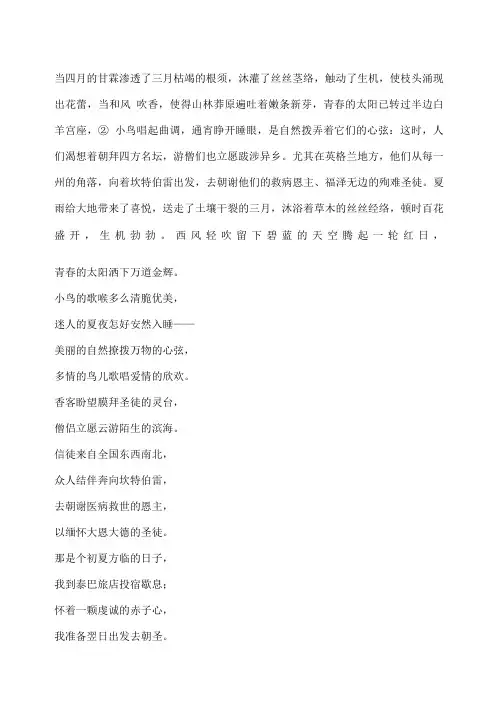
当四月的甘霖渗透了三月枯竭的根须,沐灌了丝丝茎络,触动了生机,使枝头涌现出花蕾,当和风吹香,使得山林莽原遍吐着嫩条新芽,青春的太阳已转过半边白羊宫座,②小鸟唱起曲调,通宵睁开睡眼,是自然拨弄着它们的心弦:这时,人们渴想着朝拜四方名坛,游僧们也立愿跋涉异乡。
尤其在英格兰地方,他们从每一州的角落,向着坎特伯雷出发,去朝谢他们的救病恩主、福泽无边的殉难圣徒。
夏雨给大地带来了喜悦,送走了土壤干裂的三月,沐浴着草木的丝丝经络,顿时百花盛开,生机勃勃。
西风轻吹留下碧蓝的天空腾起一轮红日,青春的太阳洒下万道金辉。
小鸟的歌喉多么清脆优美,迷人的夏夜怎好安然入睡——美丽的自然撩拨万物的心弦,多情的鸟儿歌唱爱情的欣欢。
香客盼望膜拜圣徒的灵台,僧侣立愿云游陌生的滨海。
信徒来自全国东西南北,众人结伴奔向坎特伯雷,去朝谢医病救世的恩主,以缅怀大恩大德的圣徒。
那是个初夏方临的日子,我到泰巴旅店投宿歇息;怀着一颗虔诚的赤子心,我准备翌日出发去朝圣。
黄昏前后华灯初上时分,旅店院里涌入很多客人;二十九人来自各行各业,不期而遇都到旅店过夜。
这些香客人人虔心诚意,次日要骑马去坎特伯雷。
客房与马厩宽敞又洁净,店主的招待周到而殷勤。
夕阳刚从地平线上消失,众人同我已经相互结识;大家约好不等鸡鸣就起床,迎着熹微晨光干燥把路上。
可是在我叙述故事之前,让我占用诸位一点时间,依我之见似乎还很必要,把每人的情况作些介绍。
谈谈他们从事什么行业,社会地位属于哪个阶层,容貌衣着举止又是如何,那么我就先把骑士说说。
骑士的人品出众而且高尚,自从军以来就驰骋于疆场,待人彬彬有礼,大度而豪爽,珍惜荣誉节操和骑士风尚。
为君主效命创辉煌战绩,所到国家之远无人能比,转战于基督和异教之邦,因功勋卓着缕缕受表彰。
他攻打过亚历山大利亚;在普鲁士庆功宴上有他,这位佼佼者多次坐首席;从立陶宛直打到俄罗斯,同级的骑士都大为逊色;攻克阿给西勒有他一个,还出征到过柏尔玛利亚;夺取烈亚斯和萨塔利亚;他还多次游弋于地中海,跟随登陆大军将敌战败。
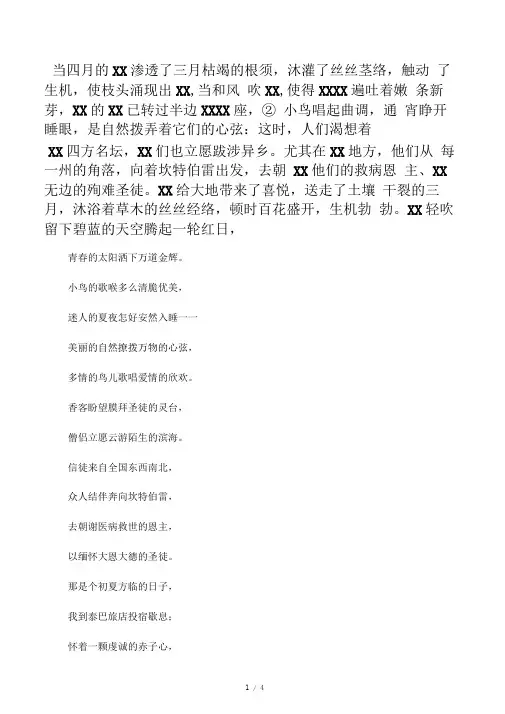
当四月的XX渗透了三月枯竭的根须,沐灌了丝丝茎络,触动了生机,使枝头涌现出XX,当和风吹XX,使得XXXX遍吐着嫩条新芽,XX的XX已转过半边XXXX座,② 小鸟唱起曲调,通宵睁开睡眼,是自然拨弄着它们的心弦:这时,人们渴想着XX四方名坛,XX们也立愿跋涉异乡。
尤其在XX地方,他们从每一州的角落,向着坎特伯雷出发,去朝XX他们的救病恩主、XX 无边的殉难圣徒。
XX给大地带来了喜悦,送走了土壤干裂的三月,沐浴着草木的丝丝经络,顿时百花盛开,生机勃勃。
XX轻吹留下碧蓝的天空腾起一轮红日,青春的太阳洒下万道金辉。
小鸟的歌喉多么清脆优美,迷人的夏夜怎好安然入睡一一美丽的自然撩拨万物的心弦,多情的鸟儿歌唱爱情的欣欢。
香客盼望膜拜圣徒的灵台,僧侣立愿云游陌生的滨海。
信徒来自全国东西南北,众人结伴奔向坎特伯雷,去朝谢医病救世的恩主,以缅怀大恩大德的圣徒。
那是个初夏方临的日子,我到泰巴旅店投宿歇息;怀着一颗虔诚的赤子心,我准备翌日出发去朝圣。
黄昏前后华灯初上时分,旅店院里涌入很多客人;二十九人来自各行各业,不期而遇都到旅店过夜。
这些香客人人虔心诚意,次日要骑马去坎特伯雷。
客房与马厩宽敞又洁净,店主的招待周到而殷勤。
夕阳刚从地平线上消失,众人同我已经相互结识;大家约好不等鸡鸣就起床, 迎着熹微晨光干燥把路上。
可是在我叙述故事之前,让我占用诸位一点时间,依我之见似乎还很必要,把每人的情况作些介绍。
谈谈他们从事什么行业,社会地位属于哪个阶层,容貌衣着举止又是如何,那么我就先把骑士说说骑士的人品出众而且高尚,自从军以来就驰骋于疆场,待人彬彬有礼,大度而豪爽, 珍惜荣誉节操和骑士风尚。
为君主效命创辉煌战绩,所到国家之远无人能比,转战于基督和异教之邦,因功勋卓著缕缕受表彰。
他攻打过亚历山大利亚;在普鲁士庆功宴上有他,这位佼佼者多次坐首席;从立陶宛直打到俄罗斯,同级的骑士都大为逊色;攻克阿给西勒有他一个,还出征到过柏尔玛利亚;夺取烈亚斯和萨塔利亚;他还多次游弋于地中海,跟随登陆大军将敌战败。
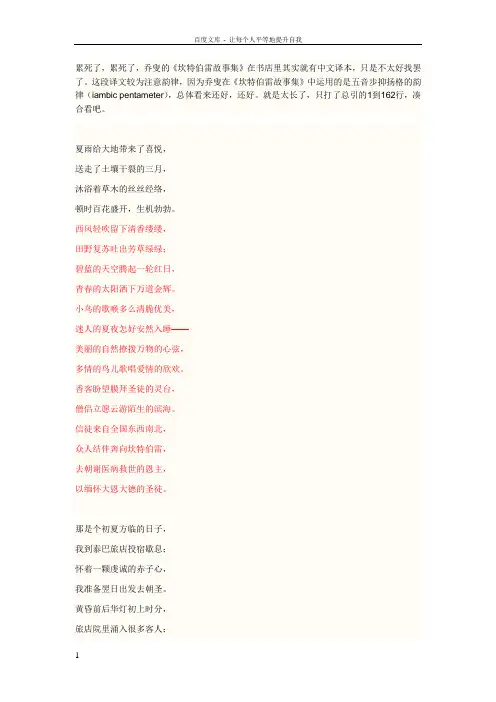
累死了,累死了,乔叟的《坎特伯雷故事集》在书店里其实就有中文译本,只是不太好找罢了。
这段译文较为注意韵律,因为乔叟在《坎特伯雷故事集》中运用的是五音步抑扬格的韵律(iambic pentameter),总体看来还好,还好。
就是太长了,只打了总引的1到162行,凑合看吧。
夏雨给大地带来了喜悦,送走了土壤干裂的三月,沐浴着草木的丝丝经络,顿时百花盛开,生机勃勃。
西风轻吹留下清香缕缕,田野复苏吐出芳草绿绿;碧蓝的天空腾起一轮红日,青春的太阳洒下万道金辉。
小鸟的歌喉多么清脆优美,迷人的夏夜怎好安然入睡——美丽的自然撩拨万物的心弦,多情的鸟儿歌唱爱情的欣欢。
香客盼望膜拜圣徒的灵台,僧侣立愿云游陌生的滨海。
信徒来自全国东西南北,众人结伴奔向坎特伯雷,去朝谢医病救世的恩主,以缅怀大恩大德的圣徒。
那是个初夏方临的日子,我到泰巴旅店投宿歇息;怀着一颗虔诚的赤子心,我准备翌日出发去朝圣。
黄昏前后华灯初上时分,旅店院里涌入很多客人;二十九人来自各行各业,不期而遇都到旅店过夜。
这些香客人人虔心诚意,次日要骑马去坎特伯雷。
客房与马厩宽敞又洁净,店主的招待周到而殷勤。
夕阳刚从地平线上消失,众人同我已经相互结识;大家约好不等鸡鸣就起床,迎着熹微晨光干燥把路上。
可是在我叙述故事之前,让我占用诸位一点时间,依我之见似乎还很必要,把每人的情况作些介绍。
谈谈他们从事什么行业,社会地位属于哪个阶层,容貌衣着举止又是如何,那么我就先把骑士说说。
骑士的人品出众而且高尚,自从军以来就驰骋于疆场,待人彬彬有礼,大度而豪爽,珍惜荣誉节操和骑士风尚。
为君主效命创辉煌战绩,所到国家之远无人能比,转战于基督和异教之邦,因功勋卓著缕缕受表彰。
他攻打过亚历山大利亚;在普鲁士庆功宴上有他,这位佼佼者多次坐首席;从立陶宛直打到俄罗斯,同级的骑士都大为逊色;攻克阿给西勒有他一个,还出征到过柏尔玛利亚;夺取烈亚斯和萨塔利亚;他还多次游弋于地中海,跟随登陆大军将敌战败。
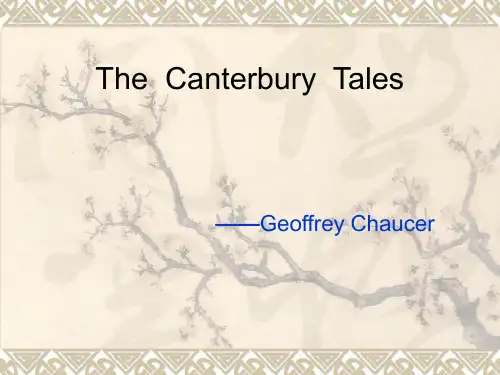
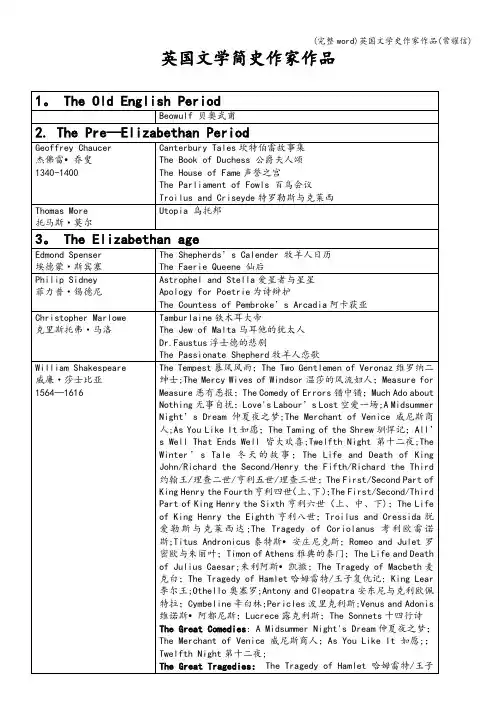
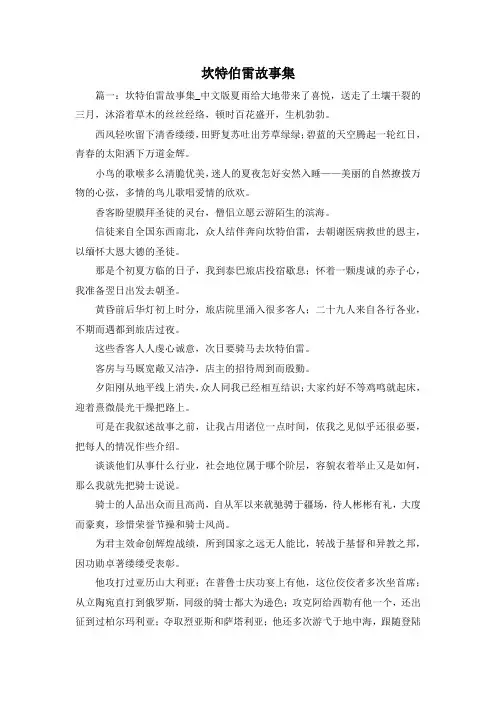
坎特伯雷故事集
篇一:坎特伯雷故事集_中文版夏雨给大地带来了喜悦,送走了土壤干裂的三月,沐浴着草木的丝丝经络,顿时百花盛开,生机勃勃。
西风轻吹留下清香缕缕,田野复苏吐出芳草绿绿;碧蓝的天空腾起一轮红日,青春的太阳洒下万道金辉。
小鸟的歌喉多么清脆优美,迷人的夏夜怎好安然入睡——美丽的自然撩拨万物的心弦,多情的鸟儿歌唱爱情的欣欢。
香客盼望膜拜圣徒的灵台,僧侣立愿云游陌生的滨海。
信徒来自全国东西南北,众人结伴奔向坎特伯雷,去朝谢医病救世的恩主,以缅怀大恩大德的圣徒。
那是个初夏方临的日子,我到泰巴旅店投宿歇息;怀着一颗虔诚的赤子心,我准备翌日出发去朝圣。
黄昏前后华灯初上时分,旅店院里涌入很多客人;二十九人来自各行各业,不期而遇都到旅店过夜。
这些香客人人虔心诚意,次日要骑马去坎特伯雷。
客房与马厩宽敞又洁净,店主的招待周到而殷勤。
夕阳刚从地平线上消失,众人同我已经相互结识;大家约好不等鸡鸣就起床,迎着熹微晨光干燥把路上。
可是在我叙述故事之前,让我占用诸位一点时间,依我之见似乎还很必要,把每人的情况作些介绍。
谈谈他们从事什么行业,社会地位属于哪个阶层,容貌衣着举止又是如何,那么我就先把骑士说说。
骑士的人品出众而且高尚,自从军以来就驰骋于疆场,待人彬彬有礼,大度而豪爽,珍惜荣誉节操和骑士风尚。
为君主效命创辉煌战绩,所到国家之远无人能比,转战于基督和异教之邦,因功勋卓著缕缕受表彰。
他攻打过亚历山大利亚;在普鲁士庆功宴上有他,这位佼佼者多次坐首席;从立陶宛直打到俄罗斯,同级的骑士都大为逊色;攻克阿给西勒有他一个,还出征到过柏尔玛利亚;夺取烈亚斯和萨塔利亚;他还多次游弋于地中海,跟随登陆。
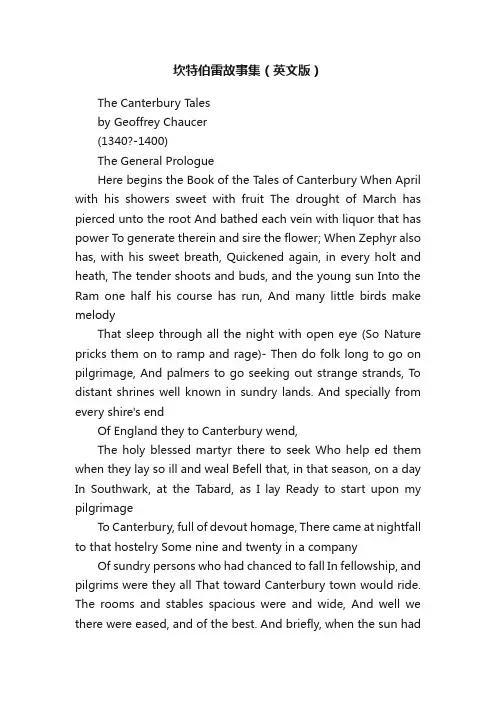
坎特伯雷故事集(英文版)The Canterbury Talesby Geoffrey Chaucer(1340?-1400)The General PrologueHere begins the Book of the Tales of Canterbury When April with his showers sweet with fruit The drought of March has pierced unto the root And bathed each vein with liquor that has power To generate therein and sire the flower; When Zephyr also has, with his sweet breath, Quickened again, in every holt and heath, The tender shoots and buds, and the young sun Into the Ram one half his course has run, And many little birds make melodyThat sleep through all the night with open eye (So Nature pricks them on to ramp and rage)- Then do folk long to go on pilgrimage, And palmers to go seeking out strange strands, To distant shrines well known in sundry lands. And specially from every shire's endOf England they to Canterbury wend,The holy blessed martyr there to seek Who help ed them when they lay so ill and weal Befell that, in that season, on a day In Southwark, at the Tabard, as I lay Ready to start upon my pilgrimageTo Canterbury, full of devout homage, There came at nightfall to that hostelry Some nine and twenty in a company Of sundry persons who had chanced to fall In fellowship, and pilgrims were they all That toward Canterbury town would ride. The rooms and stables spacious were and wide, And well we there were eased, and of the best. And briefly, when the sun hadgone to rest, So had I spoken with them, every one, That I was of their fellowship anon,And made agreement that we'd early rise To take the road, as you I will apprise.1/38页But none the less, whilst I have time and space, Before yet farther in this tale I pace, It seems to me accordant with reason To inform you of the state of every one Of all of these, as it appeared to me, And who they were, and what was their degree, And even how arrayed there at the inn; And with a knight thus will I first begin. THE KNIGHTA knight there was, and he a worthy man, Who, from the moment that he first began To ride about the world, loved chivalry, Truth, honour, freedom and all courtesy. Full worthy was he in his liege-lord's war, And therein had he ridden (none more far) As well in Christendom as heathenesse, And honoured everywhere for worthiness. At Alexandria, he, when it was won; Full oft the table's roster he'd begun Above all nations' knights in Prussia. In Latvia raided he, and Russia,No christened man so oft of his degree. In far Granada at the siege was he Of Algeciras, and in Belmarie.At Ayas was he and at SatalyeWhen they were won; and on the Middle Sea At many a noble meeting chanced to be. Of mortal battles he had fought fifteen, And he'd fought for our faith at Tramissene Three times in lists, and each time slain his foe. This self-same worthy knight had been also At one time with the lord of Palatye Against another heathen in Turkey: And always won he sovereign fame for prize. Though so illustrious, he was very wise And bore himself as meekly as a maid. He never yet had any vileness said,In all his life, to whatsoever wight. He was a truly perfect, gentle knight. But now, to tell you all of his array, His steeds were good, but yet he was not gay. Of simple fustian wore he a jupon Sadly discoloured by his habergeon;2/38页For he had lately come from his voyage And now was going on this pilgrimage. THE SQUIREWith him there was his son, a youthful squire, A lover and a lusty bachelor,With locks well curled, as if they'd laid in press. Some twenty years of age he was, I guess. In stature he was of an average length, Wondrously active, aye, and great of strength. He'd ridden sometime with the cavalry In Flanders, in Artois, and Picardy, And borne him well within that little space In hope to win thereby his lady's grace. Prinked out he was, as if he were a mead, All full of fresh-cut flowers white and red. Singing he was, or fluting, all the day; He was as fresh as is the month of May. Short was his gown, with sleeves both long and wide. Well could be sit on horse, and fairly ride. He could make songs and words thereto indite, Joust, and dance too, as well as sketch and write. So hot he loved that, while night told her tale, He slept no more than does a nightingale. Courteous he, and humble, willing and able, And carved before his father at the table. THE YEOMANA yeoman had he, nor more servants, no, At that time, for he chose to travel so; And he was clad in coat and hood of green. A sheaf of peacock arrows bright and keen Under his belt he bore right carefully (Well could he keep his tackle yeomanly: His arrows had no draggled feathers low), And in his hand he bore a mighty bow. A cropped head had he and a sun-browned face. Of woodcraft knew he all the useful ways. Upon his arm he bore abracer gay,And at one side a sword and buckler, yea, And at the other side a dagger bright, Well sheathed and sharp as spear point in the light; On breast a Christopher of silver sheen. He bore a horn in baldric all of green; A forester he truly was, I guess.3/38页THE PRIORESSThere was also a nun, a prioress,Who, in her smiling, modest was and coy; Her greatest oath was but 'By Saint Eloy!' And she was known as Madam Eglantine. Full well she sang the services divine, Intoning through her nose, becomingly; And fair she spoke her French, and fluently, After the school of Stratford-at-the-Bow, For French of Paris was not hers to know. At table she had been well taught withal, And never from her lips let morsels fall, Nor dipped her fingers deep in sauce, but ate With so much care the food upon her plate That never driblet fell upon her breast. In courtesy she had delight and zest. Her upper lip was always wiped so clean That in her cup was no iota seenOf grease, when she had drunk her draught of wine. Becomingly she reached for meat to dine. And certainly delighting in good sport, She was right pleasant, amiable- in short. She was at pains to counterfeit the look Of courtliness, and stately manners took, And would be held worthy of reverence. But, to say something of her moral sense, She was so charitable and piteousThat she would weep if she but saw a mouse Caught in a trap, though it were dead or bled. She had some little dogs, too, that she fed On roasted flesh, or milk and fine white bread. But sore she'd weep if one of them were dead, Or if men smote it with arod to smart: For pity ruled her, and her tender heart. Right decorous her pleated wimple was; Her nose was fine; her eyes were blue as glass; Her mouth was small and therewith soft and red; But certainly she had a fair forehead; It was almost a full span broad, I own, For, truth to tell, she was not undergrown. Neat was her cloak, as I was well aware. Of coral small about her arm she'd bear A string of beads and gauded all with green; And therefrom hung a brooch of golden sheen4/38页Whereon there was first written a crowned 'A,' And under, Amor vincit omnia.THE NUNAnother little nun with her had she,THE THREE PRIESTSWho was her chaplain; and of priests she'd three. THE MONKA monk there was, one made for mastery, An outrider, who loved his venery;A manly man, to be an abbot able.Full many a blooded horse had he in stable: And when he rode men might his bridle hear A-jingling in the whistling wind as clear, Aye, and as loud as does the chapel bell Where this brave monk was of the cell. The rule of Maurus or Saint Benedict, By reason it was old and somewhat strict, This said monk let such old things slowly pace And followed new-world manners in their place. He cared not for that text a clean-plucked hen Which holds that hunters are not holy men; Nor that a monk, when he is cloisterless, Is like unto a fish that's waterless; That is to say, a monk out of his cloister. But this same text he held not worth an oyster; And I said his opinion was right good. What? Should he study as a madman would Upon a book in cloister cell? Or yetGo labour with his hands and swink and sweat, As Austin bids? How shall the world be served? Let Austin have his toil to him reserved. Therefore he was a rider day and night; Greyhounds he had, as swift as bird in flight. Since riding and the hunting of the hare Were all his love, for no cost would he spare. I saw his sleeves were purfled at the hand With fur of grey, the finest in the land; Also, to fasten hood beneath his chin, He had of good wrought gold a curious pin: A love-knot in the larger end there was. His head was bald and shone like any glass, And smooth as one anointed was his face.5/38页。
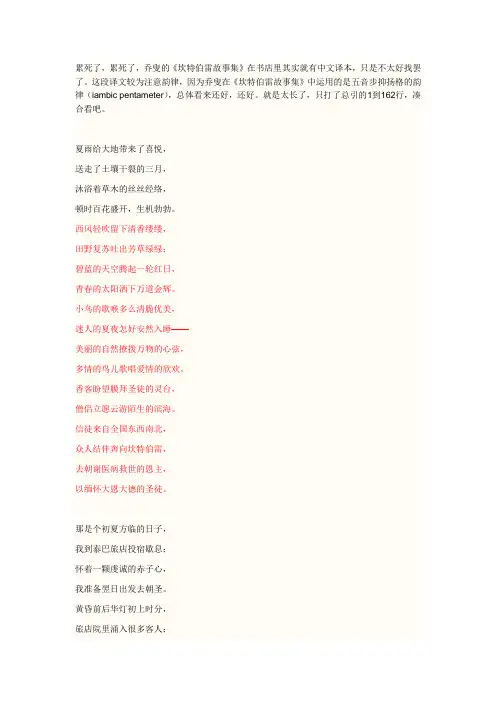
累死了,累死了,乔叟的《坎特伯雷故事集》在书店里其实就有中文译本,只是不太好找罢了。
这段译文较为注意韵律,因为乔叟在《坎特伯雷故事集》中运用的是五音步抑扬格的韵律(iambic pentameter),总体看来还好,还好。
就是太长了,只打了总引的1到162行,凑合看吧。
夏雨给大地带来了喜悦,送走了土壤干裂的三月,沐浴着草木的丝丝经络,顿时百花盛开,生机勃勃。
西风轻吹留下清香缕缕,田野复苏吐出芳草绿绿;碧蓝的天空腾起一轮红日,青春的太阳洒下万道金辉。
小鸟的歌喉多么清脆优美,迷人的夏夜怎好安然入睡——美丽的自然撩拨万物的心弦,多情的鸟儿歌唱爱情的欣欢。
香客盼望膜拜圣徒的灵台,僧侣立愿云游陌生的滨海。
信徒来自全国东西南北,众人结伴奔向坎特伯雷,去朝谢医病救世的恩主,以缅怀大恩大德的圣徒。
那是个初夏方临的日子,我到泰巴旅店投宿歇息;怀着一颗虔诚的赤子心,我准备翌日出发去朝圣。
黄昏前后华灯初上时分,旅店院里涌入很多客人;二十九人来自各行各业,不期而遇都到旅店过夜。
这些香客人人虔心诚意,次日要骑马去坎特伯雷。
客房与马厩宽敞又洁净,店主的招待周到而殷勤。
夕阳刚从地平线上消失,众人同我已经相互结识;大家约好不等鸡鸣就起床,迎着熹微晨光干燥把路上。
可是在我叙述故事之前,让我占用诸位一点时间,依我之见似乎还很必要,把每人的情况作些介绍。
谈谈他们从事什么行业,社会地位属于哪个阶层,容貌衣着举止又是如何,那么我就先把骑士说说。
骑士的人品出众而且高尚,自从军以来就驰骋于疆场,待人彬彬有礼,大度而豪爽,珍惜荣誉节操和骑士风尚。
为君主效命创辉煌战绩,所到国家之远无人能比,转战于基督和异教之邦,因功勋卓著缕缕受表彰。
他攻打过亚历山大利亚;在普鲁士庆功宴上有他,这位佼佼者多次坐首席;从立陶宛直打到俄罗斯,同级的骑士都大为逊色;攻克阿给西勒有他一个,还出征到过柏尔玛利亚;夺取烈亚斯和萨塔利亚;他还多次游弋于地中海,跟随登陆大军将敌战败。
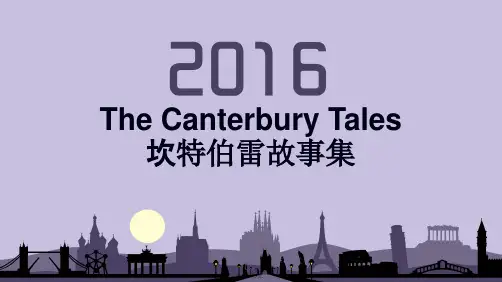
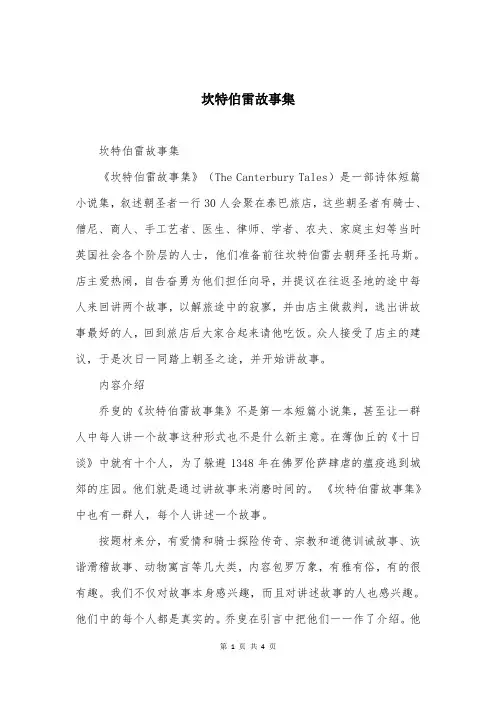
坎特伯雷故事集坎特伯雷故事集《坎特伯雷故事集》(The Canterbury Tales)是一部诗体短篇小说集,叙述朝圣者一行30人会聚在泰巴旅店,这些朝圣者有骑士、僧尼、商人、手工艺者、医生、律师、学者、农夫、家庭主妇等当时英国社会各个阶层的人士,他们准备前往坎特伯雷去朝拜圣托马斯。
店主爱热闹,自告奋勇为他们担任向导,并提议在往返圣地的途中每人来回讲两个故事,以解旅途中的寂寥,并由店主做裁判,选出讲故事最好的人,回到旅店后大家合起来请他吃饭。
众人接受了店主的建议,于是次日一同踏上朝圣之途,并开始讲故事。
内容介绍乔叟的《坎特伯雷故事集》不是第一本短篇小说集,甚至让一群人中每人讲一个故事这种形式也不是什么新主意。
在薄伽丘的《十日谈》中就有十个人,为了躲避1348年在佛罗伦萨肆虐的瘟疫逃到城郊的庄园。
他们就是通过讲故事来消磨时间的。
《坎特伯雷故事集》中也有一群人,每个人讲述一个故事。
按题材来分,有爱情和骑士探险传奇、宗教和道德训诫故事、诙谐滑稽故事、动物寓言等几大类,内容包罗万象,有雅有俗,有的很有趣。
我们不仅对故事本身感兴趣,而且对讲述故事的人也感兴趣。
他们中的每个人都是真实的。
乔叟在引言中把他们一一作了介绍。
他凭借朝圣者之口,汇集了欧洲中世纪文学中的各种主要类型。
简介乔叟(约1343—1400)英国诗人。
伦敦酒商的儿子。
十几岁起进入宫廷当差。
1359年随爱德华三世的部队远征法国,被法军俘虏,不久赎回。
乔叟与宫廷往来密切,当过廷乔叟臣、关税督察、肯特郡的治安法官、郡下议院议员。
他曾因外交事务出使许多国家和地区,到过比利时、法国、意大利等国,有机会遇见薄伽丘与彼特拉克,这对他的文学创作产生了很大的影响。
乔叟在庇护者失宠期间,被剥夺了官位和年金,经济拮据。
他曾写过打油诗《致空囊》给刚登基的亨利四世,申诉自己的贫穷。
1400年乔叟逝世,安葬在伦敦威斯敏特斯教堂的“诗人之角”。
创作背景4月的一天,一群香客去坎特伯雷朝圣,投宿在泰巴旅店。
当四月的甘霖渗透了三月枯竭的根须,沐灌了丝丝茎络,触动了生机,使枝头涌吹香,使得山林莽原遍吐着嫩条新芽,青春的太阳已转过半边现出花蕾,当和风小鸟唱起曲调,通宵睁开睡眼,是自然拨弄着它们的心弦:这时,白羊宫座,②人们渴想着朝拜四方名坛,游僧们也立愿跋涉异乡。
尤其在英格兰地方,他们从每一州的角落,向着坎特伯雷出发,去朝谢他们的救病恩主、福泽无边的殉难圣徒。
夏雨给大地带来了喜悦,送走了土壤干裂的三月,沐浴着草木的丝丝经络,,红日空腾起一轮天下风勃开百花盛,生机勃。
西轻吹留碧蓝的时顿青春的太阳洒下万道金辉。
小鸟的歌喉多么清脆优美,迷人的夏夜怎好安然入睡——美丽的自然撩拨万物的心弦,多情的鸟儿歌唱爱情的欣欢。
香客盼望膜拜圣徒的灵台,僧侣立愿云游陌生的滨海。
信徒来自全国东西南北,众人结伴奔向坎特伯雷,去朝谢医病救世的恩主,以缅怀大恩大德的圣徒。
那是个初夏方临的日子,我到泰巴旅店投宿歇息;怀着一颗虔诚的赤子心,我准备翌日出发去朝圣。
.黄昏前后华灯初上时分,旅店院里涌入很多客人;二十九人来自各行各业,不期而遇都到旅店过夜。
这些香客人人虔心诚意,次日要骑马去坎特伯雷。
客房与马厩宽敞又洁净,店主的招待周到而殷勤。
夕阳刚从地平线上消失,众人同我已经相互结识;大家约好不等鸡鸣就起床,迎着熹微晨光干燥把路上。
可是在我叙述故事之前,让我占用诸位一点时间,依我之见似乎还很必要,把每人的情况作些介绍。
谈谈他们从事什么行业,社会地位属于哪个阶层,容貌衣着举止又是如何,那么我就先把骑士说说。
骑士的人品出众而且高尚,自从军以来就驰骋于疆场,待人彬彬有礼,大度而豪爽,珍惜荣誉节操和骑士风尚。
为君主效命创辉煌战绩,所到国家之远无人能比,转战于基督和异教之邦,因功勋卓着缕缕受表彰。
他攻打过亚历山大利亚;在普鲁士庆功宴上有他,这位佼佼者多次坐首席;从立陶宛直打到俄罗斯,同级的骑士都大为逊色;攻克阿给西勒有他一个,还出征到过柏尔玛利亚;夺取烈亚斯和萨塔利亚;他还多次游弋于地中海,跟随登陆大军将敌战败。
(完整word版)坎特伯雷故事集_中文版
当四月的甘霖渗透了三月枯竭的根须,沐灌了丝丝茎络,触动了生机,使枝头涌现出花蕾,当和风吹香,使得山林莽原遍吐着嫩条新芽,青春的太阳已转过半边白羊宫座,②小鸟唱起曲调,通宵睁开睡眼,是自然拨弄着它们的心弦:这时,人们渴想着朝拜四方名坛,游僧们也立愿跋涉异乡。
尤其在英格兰地方,他们从每一州的角落,向着坎特伯雷出发,去朝谢他们的救病恩主、福泽无边的殉难圣徒。
夏雨给大地带来了喜悦,送走了土壤干裂的三月,沐浴着草木的丝丝经络,顿时百花盛开,生机勃勃。
西风轻吹留下碧蓝的天空腾起一轮红日,青春的太阳洒下万道金辉。
小鸟的歌喉多么清脆优美,
迷人的夏夜怎好安然入睡——
美丽的自然撩拨万物的心弦,
多情的鸟儿歌唱爱情的欣欢。
香客盼望膜拜圣徒的灵台,
僧侣立愿云游陌生的滨海。
信徒来自全国东西南北,
众人结伴奔向坎特伯雷,
去朝谢医病救世的恩主,
以缅怀大恩大德的圣徒。
那是个初夏方临的日子,
我到泰巴旅店投宿歇息;
怀着一颗虔诚的赤子心,
我准备翌日出发去朝圣。
黄昏前后华灯初上时分,
旅店院里涌入很多客人;
二十九人来自各行各业,
不期而遇都到旅店过夜。
这些香客人人虔心诚意,
次日要骑马去坎特伯雷。
客房与马厩宽敞又洁净,店主的招待周到而殷勤。
夕阳刚从地平线上消失,众人同我已经相互结识;大家约好不等鸡鸣就起床,迎着熹微晨光干燥把路上。
可是在我叙述故事之前,让我占用诸位一点时间,依我之见似乎还很必要,把每人的情况作些介绍。
谈谈他们从事什么行业,社会地位属于哪个阶层,容貌衣着举止又是如何,。
【优质文档】坎特伯雷故事集读后感-易修改word版
本文部分内容来自网络,本司不为其真实性负责,如有异议或侵权请及时联系,本司将予以删除!
== 本文为word格式,下载后可随意编辑修改! ==
坎特伯雷故事集读后感
坎特伯雷故事集读后感:《坎特伯雷故事集》是一部诗体短篇小说集,叙述朝圣者一行30人会聚在泰巴旅店,这些朝圣者有骑士、僧尼、商人、手工艺者、医生、律师、学者、农夫、家庭主... 来看下面:
坎特伯雷故事集读后感【1】
看到这里,本人有些疑惑了。
Knight翻译为“武士”,Chivalry 翻译为“武士道精神”实在是让在下有点无法接受。
就好像友人从外国带回一精美工艺品赠与在下,爱不释手把玩许久,却发现座底屹然印着大大的三个单词“Made in China”那样的愕然。
相对“骑士”,“武士”也许会更容易让中国人接受,且Knight也的确有“武士”的意思。
不过在这篇文章中,这样的归化翻译是否会有些过头?如若不知原文,且对西欧文化了解甚少,这样的翻译岂不会给人“这个朝圣者是日本人”的感觉?毕竟就本人看来,“武士道精神”已深深根植于日本文化之中了。
还有一处就是“出道”二字让本人有种奇怪的感觉,虽然在《中华在线词典》中,“出道”有——方言,指年轻人走上社会,能独立工作和生活——这层意思,但毕竟在现实生活里用得不广泛,故觉得这么翻译略有不妥。
不过,有些地方不去深究也并不影响正确理解和顺利阅读,因此从整体意义上来说,这个译本还是很有价值的,比较真实流畅地传达了作者的本意。
本文部分内容来自网络整理所得,本司不为其真实性负责,如有异议或侵权请及时联系,本司将立即予以删除!== 本文为word格式,下载后可方便编辑修改文字! ==坎特伯雷故事集读后感坎特伯雷故事集读后感:《坎特伯雷故事集》是一部诗体短篇小说集,叙述朝圣者一行30人会聚在泰巴旅店,这些朝圣者有骑士、僧尼、商人、手工艺者、医生、律师、学者、农夫、家庭主... 来看下面:坎特伯雷故事集读后感【1】看到这里,本人有些疑惑了。
Knight翻译为“武士”,Chivalry 翻译为“武士道精神”实在是让在下有点无法接受。
就好像友人从外国带回一精美工艺品赠与在下,爱不释手把玩许久,却发现座底屹然印着大大的三个单词“Made in China”那样的愕然。
相对“骑士”,“武士”也许会更容易让中国人接受,且Knight也的确有“武士”的意思。
不过在这篇文章中,这样的归化翻译是否会有些过头?如若不知原文,且对西欧文化了解甚少,这样的翻译岂不会给人“这个朝圣者是日本人”的感觉?毕竟就本人看来,“武士道精神”已深深根植于日本文化之中了。
还有一处就是“出道”二字让本人有种奇怪的感觉,虽然在《中华在线词典》中,“出道”有——方言,指年轻人走上社会,能独立工作和生活——这层意思,但毕竟在现实生活里用得不广泛,故觉得这么翻译略有不妥。
不过,有些地方不去深究也并不影响正确理解和顺利阅读,因此从整体意义上来说,这个译本还是很有价值的,比较真实流畅地传达了作者的本意。
这也就为本人接下来的文字和分析提供了一个较科学的基矗整本书看下来,最大的感言是——乔叟这厮太油菜了(油菜=有才)!且不论他的写作是采用十音节“双韵体”(后来发展为著名的‘英雄双韵体’)的抑扬格诗再加上两篇散文,光是看他塑造的那些栩栩如生的人物就足矣。
从高贵的骑士到贫贱的农夫,从尊荣的女修道院长到口无遮拦的巴斯妇,各行各业各个阶层,无一雷同。
他们的语言,行为,外貌,无一不反映了14世纪英国的社会现状。
The PilgrimsThe Narrator- The narrator makes it quite clear that he is also a character in his book. Although he is called Chaucer, we should be wary of accepting his words and opinions as Chaucer’s own. In the General Prologue, the narrator presents himself as a gregarious and naïve character. Later on, the Host accuses him of being silent and sullen. Because the narrator writes down his impressions of the pilgrims from memory, whom he does and does not like, and what he chooses and chooses not to remember about the characters, tells us as much about the narrator’s own prejudices as it does about the characters themselves. The Knight- The first pilgrim Chaucer describes in the General Prologue, and the teller of the first tale. The Knight represents the ideal of a medieval Christian man-at-arms. He has participated in no less than fifteen of the great crusades of his era. Brave, experienced, and prudent, the narrator greatly admires him.Read an in-depth analysis of The Knight.The Wife of Bath- Bath is an English town on the Avon River, not the name of this woman’s husband. Though she is a seamstress by occupation, she seems to be a professional wife. She has been married five times and had many other affairs in her youth, making her well practiced in the art of love. She presents herself as someone who loves marriage and sex, but, from what we see of her, she also takes pleasure in rich attire, talking, and arguing. She is deaf in one ear and has a gap between her front teeth, which was considered attractive in Chaucer’s time. She has traveled on pilgrimages to Jerusalem three times and elsewhere in Europe as well.Read an in-depth analysis of The Wife of Bath.The Pardoner- Pardoners granted papal indulgences—reprieves from penance in exchange for charitable donations to the Church. Many pardoners, including this one, collected profits for themselv es. In fact, Chaucer’s Pardoner excels in fraud, carrying a bag full of fake relics—for example, he claims to have the veil of the Virgin Mary. The Pardoner has long, greasy, yellow hair and is beardless. These characteristics were associated with shiftine ss and gender ambiguity in Chaucer’s time. The Pardoner also has a gift for singing and preaching whenever he finds himself inside a church.Read an in-depth analysis of The Pardoner.The Miller- Stout and brawny, the Miller has a wart on his nose and a big mouth, both literally and figuratively. He threatens the Host’s notion of propriety when he drunkenly insists on telling the second tale.Indeed, the Miller seems to enjoy overturning all conventions: he ruins the Host’s carefully planned storytelling order; he rips doors off hinges; and he tells a tale that is somewhat blasphemous, ridiculing religious clerks, scholarly clerks, carpenters, and women.The Prioress- Described as modest and quiet, this Prioress (a nun who is head of her convent) aspires to have exquisite taste. Her table manners are dainty, she knows French (though not the French of the court), she dresses well, and she is charitable and compassionate.The Monk - Most monks of the Middle Ages lived in monasteries according to the Rule of Saint Benedict, which demanded that they devote their lives to “work and prayer.” This Monk cares little for the Rule; his devotion is to hunting and eating. He is large, loud, and well clad in hunting boots and furs.The Friar - Roaming priests with no ties to a monastery, friars were a great object of criticism in Chaucer’s time. Always ready to befriend young women or rich men who might need his services, the friar actively administers the sacraments in his town, especially those of marriage and confession. However, Chaucer’s worldly Friar has taken to accepting bribes.The Summoner - The Summoner brings persons accused of violating Church law to ecclesiastical court. This Summoner is a lecherous man whose face is scarred by leprosy. He gets drunk frequently, is irritable, and is not particularly qualified for his position. He spouts the few words of Latin he knows in an attempt to sound educated.The Host - The leader of the group, the Host is large, loud, and merry, although he possesses a quick temper. He mediates among the pilgrims and facilitates the flow of the tales. His title of “host” may be a pun, suggesting both an innkeeper and the Eucharist, or Holy Host.The Parson - The only devout churchman in the company, the Parson lives in poverty, but is rich in holy thoughts and deeds. The pastor of a sizable town, he preaches the Gospel and makes sure to practice what he preaches. He is everything that the Monk, the Friar, and the Pardoner are not.The Squire - The Knight’s son and apprentice. The Squire is curly-haired, youthfully handsome, and loves dancing and courting.The Clerk - The Clerk is a poor student of philosophy. Having spent his money on books and learning rather than on fine clothes, he is threadbare and wan. He speaks little, but when he does, his words are wise and full of moral virtue.The Man of Law - A successful lawyer commissioned by the king. He upholds justice in matters large and small and knows every statute of England’s law by heart.The Manciple - A manciple was in charge of getting provisions for a college or court. Despite his lack of education, this Manciple is smarter than the thirty lawyers he feeds.The Merchant - The Merchant trades in furs and other cloths, mostly from Flanders. Heis part of a powerful and wealthy class in Chaucer’s society.The Shipman - Brown-skinned from years of sailing, the Shipman has seen every bay and river in England, and exotic ports in Spain and Carthage as well. He is a bit of a rascal, known for stealing wine while the ship’s captain sleeps.The Physician - The Physician is one of the best in his profession, for he knows the cause of every malady and can cure most of them. Though the Physician keeps himself in perfect physical health, the narrator calls into question the Physician’s spiritual health: he rarely consults the Bible and has an unhealthy love of financial gain.The Franklin - The word “franklin” means “free man.” In Chaucer’s society, a franklin was neither a vassal serving a lord nor a member of the nobility. This particular franklin is a connoisseur of food and wine, so much so that his table remains laid and ready for food all day.The Reeve - A reeve was similar to a steward of a manor, and this reeve performs his job shrewdly—his lord never loses so much as a ram to the other employees, and the vassals under his command are kept in line. However, he steals from his master.The Plowman - The Plowman is the Parson’s brother and is equally good-hearted. A member of the peasant class, he pays his tithes to the Church and leads a good Christian life.The Guildsmen - Listed together, the five Guildsmen appear as a unit. English guilds were a combination of labor unions and social fraternities: craftsmen of similar occupations joined together to increase their bargaining power and live communally. All five Guildsmen are clad in the livery of their brotherhood.The Cook - The Cook works for the Guildsmen. Chaucer gives little detail about him, although he mentions a crusty sore on the Cook’s leg.The Yeoman - The servant who accompanies the Knight and the Squire. The narrator mentions that his dress and weapons suggest he may be a forester.The Second Nun - The Second Nun is not described in the General Prologue, but she tells a saint’s life for her tale.The Nun’s Priest - Like the Second Nun, the Nun’s Priest is not described in the General Prologue. His story of Chanticleer, however, is well crafted and suggests that he is a witty, self-effacing preacher.Characters from the Five Tales Analyzed in This SparkNoteThe Knight’s TaleTheseus - A great conqueror and the duke of Athens in the Knight’s Tale. The most powerful ruler in the story, he is often called upon to make the final judgment, but helistens to others’ pleas for help.Palamon - Palamon is one of the two imprisoned Theban soldier heroes in the Knight’s Tale. Brave, strong, and sworn to everlasting friendship with his cousin Arcite, Palamon falls in love with the fair maiden Emelye, which brings him into conflict with Arcite. Though he loses the tournament against Arcite, he gets Emelye in the end.Arcite - The sworn brother to Palamon, Arcite, imprisoned with Palamon in the tower in the Knight’s Tale, falls equally head over heels in love with Emelye. He gets released from the tower early and wins Emelye’s hand in a tournament, but then dies when a divinely fated earthquake causes his horse to throw him.Emelye - Emelye is the sister to Hippolyta, Theseus’s domesticated Amazon queen in the Knight’s Tale. Fair-haired and glowing, we first see Emelye as Palamon does, through a window. Although she is the object of both Palamon’s and Arcite’s desire, she would rather spend her life unmarried and childless. Nevertheless, when Arcite wins the tournament, she readily pledges herself to him.Egeus - Theseus’s father. Egeus gives Theseus the advice that helps him convince Palamon and Emelye to end their mourning of Arcite and get married.The Miller’s TaleNicholas - In the Miller’s Tale, Nicholas is a poor astronomy student who boards with an elderly carpenter, John, and the carpenter’s too-young wife, Alisoun. Nicholas dupes John and sleeps with Alisoun right under John’s nose, but Absolon, the foppish parish clerk, gets Nicholas in the end.Alisoun - Alisoun is the sexy young woman married to the carpenter in the Miller’s Tale. She is bright and sweet like a small bird, and dresses in a tantalizing style—her clothes are embroidered inside and outside, and she laces her boots high. She willingly goes to bed with Nicholas, but she has only harsh words and obscenities for Absolon.Absolon - The local parish clerk in the Miller’s Tale, Absolon is a little bit foolish and more than a little bit vain. He wears red stockings underneath his floor-length church gown, and his leather shoes are decorated like the fanciful stained-glass windows in a cathedral. He curls his hair, uses breath fresheners, and fancies Alisoun.John - The dim-witted carpenter to whom Alisoun is married and with whom Nicholas boards. John is jealous and possessive of his wife. He constantly berates Nicholas for looking into God’s “pryvetee,” but when Nicholas offers John the chance to share his knowledge, John quickly accepts. He gullibly believes Nicholas’s pronouncement that a second flood is coming, which allows Nicholas to sleep with John’s wife.The Wife of Bath’s Prologue and TaleThe First Three Husbands - The Wife of Bath says that her first three husbands were “good” because they were rich and old. She could order them around, use sex to get what she wanted, and trick them into believing lies.The Fourth Husband - The Wife of Bath says comparatively little about her fourth husband. She loved him, but he was a reveler who had a mistress. She had fun singing and dancing with him, but tried her best to make him jealous. She fell in love with her fifth husband, Jankyn, while she was still married to her fourth.Jankyn - The Wife of Bath’s fifth husband, Jankyn, was a twenty-year-old former student, with whom the Wife was madly in love. His stories of wicked wives frustrated her so much that one night she ripped a page out of his book, only to receive a deafening smack on her ear in return.The Knight - Arthur’s young knight rapes a maiden, and, to avoid the punishment of death, he is sent by the queen on a quest to learn about submission to women. Once he does so, and shows that he has learned his lesson by letting his old ugly wife make a decision, she rewards him by becoming beautiful and submissive.Read an in-depth analysis of The Knight.The Old Woman - The old woman supplies the young knight with the answer to his question, in exchange for his promise to do whatever she wants. When she tells him he must marry her, the knight begrudgingly agrees, and when he allows her to choose whether she would like to be beautiful and unfaithful or ugly and faithful, she rewards him by becoming both beautiful and faithful.Arthur’s Queen - Arthur’s queen, presumably Guinevere, is interesting because she wields most of the power. When Arthur’s knight rapes a maiden, he turns the knight over to his queen allows her to decide what to do with him.The Pardoner’s TaleThe Three Rioters - These are the three protagonists of the Pardoner’s Tale. All three indulge in and represent the vices against which the Pardoner has railed in his Prologue: Gluttony, Drunkeness, Gambling, and Swearing. These traits define the three and eventually lead to their downfall. The Rioters at first appear like personified vices, but it is their belief that a personified concept—in this case, Death—is a real person that becomes the root cause of their undoing.The Old Man - In the Pardoner’s Tale, the three Rioters encounter a very old man whose body is completely covered except for his face. Before the old man tells the Rioters where they can find“Death,” one of the Rioters rashly demands why the old man is still alive. The old man answers that he is doomed to walk the earth for eternity. He has been interpreted as Death itself, or as Cain, punished for fratricide by walking the earth forever; or as the Wandering Jew, a man who refused to let Christ rest at his house when Christ proceeded to his crucifixion, and who was therefore doomed to roam the world, through the ages, never finding rest.The Nun’s Priest’s TaleChanticleer - The heroic rooster of the Nun’s Priest’s Tale, Chanticleer has seven hen-wives and is the most handsome cock in the barnyard. One day, he has a prophetic dream of a fox that will carry him away. Chanticleer is also a bit vain about his clear and accurate crowing voice, and he unwittingly allows a fox to flatter him out of his liberty.Pertelote - Chanticleer’s favorite wife in the Nun’s Priest’s Tale. She is his equal in looks, manners, and talent. When Chanticleer dreams of the fox, he awakens her in the middle of the night, begging for an interpretation, but Pertelote will have none of it, calling him foolish. When the fox takes him away, she mourns him in classical Greek fashion, burning herself and wailing. The Fox - The orange fox, interpreted by some as an allegorical figure for the devil, catches Chanticleer the rooster through flattery. Eventually, Chanticleer outwits the fox by encouraging him to boast of his deceit to his pursuers. When the fox opens his mouth, Chanticleer escapes.。
坎特伯雷的梗概内容" "The Canterbury story assembles " be a Chaucerian United Kingdom writer novel. Work depicts a group of pilgrim aggregation prepare to get rid of Canterbury city hadj in one wife and children of London in the inn. The shopkeeper people suggests that on passage respectively, pilgrims say two stories , look at had better who says in going there and back. Story collection has included 23 stories , the among them the most wonderful story has had: Knight's story that the tragedy story , the Bass woman say, sells the love that the knight says atoning for the crime the animal allegory story advising world allegory story , clergyman to talk , the moving love that family dispute story , peasant that the businessman says say that ticket person says compose in reply generously code of brotherhood behavior story.(汉语意思是:《坎特伯雷故事集》是英国作家乔叟的小说。
当四月的甘霖渗透了三月枯竭的根须,沐灌了丝丝茎络,触动了生机,使枝头涌现出花蕾,当和风吹香,使得山林莽原遍吐着嫩条新芽,青春的太阳已转过半边白羊宫座,②小鸟唱起曲调,通宵睁开睡眼,是自然拨弄着它们的心弦:这时,人们渴想着朝拜四方名坛,游僧们也立愿跋涉异乡。
尤其在英格兰地方,他们从每一州的角落,向着坎特伯雷出发,去朝谢他们的救病恩主、福泽无边的殉难圣徒。
夏雨给大地带来了喜悦,送走了土壤干裂的三月,沐浴着草木的丝丝经络,顿时百花盛开,生机勃勃。
西风轻吹留下碧蓝的天空腾起一轮红日,青春的太阳洒下万道金辉。
小鸟的歌喉多么清脆优美,
迷人的夏夜怎好安然入睡——
美丽的自然撩拨万物的心弦,
多情的鸟儿歌唱爱情的欣欢。
香客盼望膜拜圣徒的灵台,
僧侣立愿云游陌生的滨海。
信徒来自全国东西南北,
众人结伴奔向坎特伯雷,
去朝谢医病救世的恩主,
以缅怀大恩大德的圣徒。
那是个初夏方临的日子,
我到泰巴旅店投宿歇息;
怀着一颗虔诚的赤子心,
我准备翌日出发去朝圣。
黄昏前后华灯初上时分,
旅店院里涌入很多客人;
二十九人来自各行各业,
不期而遇都到旅店过夜。
这些香客人人虔心诚意,
次日要骑马去坎特伯雷。
客房与马厩宽敞又洁净,
店主的招待周到而殷勤。
夕阳刚从地平线上消失,
众人同我已经相互结识;
大家约好不等鸡鸣就起床,
迎着熹微晨光干燥把路上。
可是在我叙述故事之前,
让我占用诸位一点时间,
依我之见似乎还很必要,
把每人的情况作些介绍。
谈谈他们从事什么行业,
社会地位属于哪个阶层,
容貌衣着举止又是如何,
那么我就先把骑士说说。
骑士的人品出众而且高尚,自从军以来就驰骋于疆场,待人彬彬有礼,大度而豪爽,珍惜荣誉节操和骑士风尚。
为君主效命创辉煌战绩,
所到国家之远无人能比,
转战于基督和异教之邦,
因功勋卓著缕缕受表彰。
他攻打过亚历山大利亚;
在普鲁士庆功宴上有他,
这位佼佼者多次坐首席;
从立陶宛直打到俄罗斯,
同级的骑士都大为逊色;
攻克阿给西勒有他一个,
还出征到过柏尔玛利亚;
夺取烈亚斯和萨塔利亚;
他还多次游弋于地中海,
跟随登陆大军将敌战败。
十五次比武他大显身手,
为捍卫信仰而浴血奋斗;
在战场上三次杀死敌将,
高贵的武士美名传四方。
他还侍奉过柏拉西亚国君,讨伐另一支土耳其异教军;没有一次不赢得最高荣誉,他骁勇善战,聪慧而不痴愚。
他温柔顺从像个大姑娘,
一生无论是在什么地方,
对谁也没有讲过半个脏字:堪称一个完美的真骑士。
他有一批俊美的千里马,
但是他的衣着朴实无华;
开价的底下是结识的布衣,上上下下到处是斑斑污迹。
他风尘仆仆刚从战场归来,片刻未休息就急忙去朝拜。